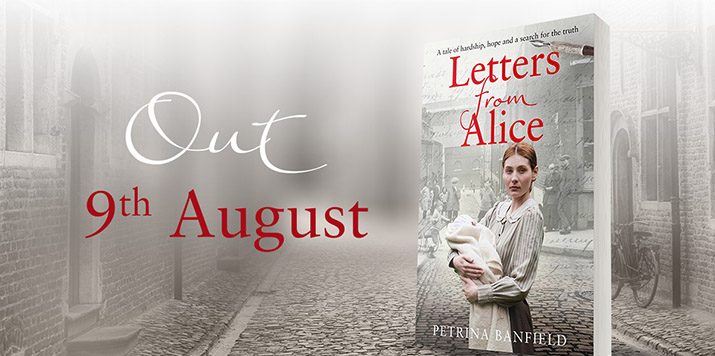Petrina Banfield’s debut book, Letters From Alice is out on 9th August. Set in 1920’s London and based on real life events this is ‘an emotional and beautifully written book’.
Here she tells us how becoming side-tracked one afternoon at the London Metropolitan Archives led to the unearthing of a treasure trove of material that inspired her to write a book…
It was a rare Saturday afternoon without the kids (to give you some context – I’m a foster carer so I’m talking rare as in, I literally couldn’t remember the last time it happened) but, having forgotten what normal people get up to when they have a few hours to themselves, instead of taking action against my stubby ponytail and unkempt brows, I took myself off to the archives to do some family research.
I’d been meaning to do a bit of digging into my father’s past ever since I found out that he spent his childhood in care, and the archives seemed a good place to start. I knew that Dad spent a prolonged period of time in hospital as a youngster, so I put in a request for some of the pre-1950 medical records and started my search there.
Within minutes of opening the old box that arrived in the reading room I knew that I was barking up the wrong tree – there was nothing on individual patients admitted during the Second World War – but by then I’d been bewitched by the smell of dusty old paper and the sight of beautiful handwritten letters tied up with string. It was towards the bottom of the box that I came across the almoner’s reports.
I read about a ‘friendless’ 15-year-old girl who had turned up at the Royal Free Hospital, terrified, alone and doubly infected with syphilis and gonorrhoea. She had ‘fallen into trouble’ and without the almoner’s help, might have ended up on the streets or in the workhouse. As it was, one of the almoners managed to find her a position in the country. She gave birth to a healthy child, and was able to visit her often.
Hooked, I delved deeper and read about girls in service who had been taken advantage of by their masters and then dismissed as soon as their pregnancy became apparent. There was a woman who had lost all her teeth after years of almost continuous pregnancy and childbirth, who might have starved to death had the almoners not stepped in and bought her some dentures, and an elderly night watchman with severe eczema on his hands, who couldn’t afford to buy himself a pair of gloves. Reading about their daily struggles was like watching an utterly absorbing boxset. I was convinced it would make a great read.
Busy with my young adopted daughter and foster children during the day, I set about compiling some of the most interesting cases late in the evenings and early mornings, before the baby woke for his bottle, and soon got a proposal together.
I’d been ghost writing for about ten years – always the bridesmaid, never the bride – so when I heard that Harper Collins had offered me a contract for a book I was over the moon. The news came just as I was moving the baby I’d been looking after onto adoption – always a tricky, emotional time – so a new adventure seemed like the perfect gift to me.
Now, I couldn’t be happier that I chose to visit the archive on my free afternoon, instead of hotfooting it to the nearest beauty salon. After all, what do unruly brows matter, when I have the excitement of seeing my own book on the shelves?
Thanks for reading! You can find more stories from the archives along with writing tips and book reviews on my website, www.petrinabanfield.co.uk or follow me on Facebook @petrinabanfield. I’m also on Twitter and Instagram @petrinabanfield


